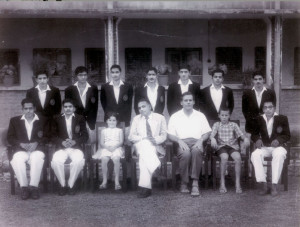Dr Norman Dahl, a Mechanical Engineering Professor at MIT co-authored what is regarded as the Bible of Mechanics of Solids along with Dr Crandall. He also played a stellar role in establishing IITK and lived here from 1962-64. He passed away at an age of 85, of Alzheimer’s disease on Jan 11 2004. Following is a speech by an IITK alumnus, Dr Arvind in his remembrance at the memorial service. Dr Arvind was a student at IIT Kanpur from 1964 to 1969. After completing his Ph.D. at University of Minnesota, he went back to teach at IITK, in the mid 70s. Today he is a Professor of Computer Science and Engineering, at MIT. Vox Populi contacted him and obtained his permission to publish this article.) “February 28, 2004 “My introduction to Norman, like many other students in Kanpur, was through Crandall and Dahl, the venerable text book through which we learned our mechanics of solids. The book was full of insightful and fun problems and extremely well suited to handing out weekly problem sets; the problem sets around which the whole student life in IIT Kanpur revolved. It was only when I joined MIT a decade later I realized that this whole (torturous!) style of large lectures, small recitation sections, weekly assignments and associated laboratories had come from here. “The success of IIT graduates is now well recognized. There are books about it and Diane Sawyer of CBS did even a 60-Minute segment on it. What is less well known even in the United States is the pivotal role of America through IIT Kanpur in this success. “The Kanpur Indo American Program known as KIAP was formed to develop IIT Kanpur from 1962 to 1972. Norman was its first chairman from 1962-64. Dr Dahl, together with Dr Kelkar, the first director of IIT Kanpur, set out to create an engineering institution which was unique in the Indian setting. They succeeded! Being at IIT was so exciting for an undergraduate like me, because for the first time we came in contact with a large number of extraordinarily bright students and professors from all over India. As compared to any school or any university this place was totally open —-labs and libraries were open either round the clock or at least until midnight; one could check out as many books from the well stocked, air conditioned library as one wanted; the dorms had no rules, and were governed by students. On one hand we studied Schrödinger’s equations, on the other we took courses on Freud, Dostovoesky and Samuelson’s Economics! There were no external board exams. In spite of the heavy study load, the place was teeming with cultural and social activities. And of course IIT Kanpur was the first institution in India to get a computer. I still remember IBM 1620 being delivered on a bullock cart to the campus. The computer center was the place to hang out. If nothing else, it was at least air conditioned. “Norman’s impact on the whole high tech culture cannot be over emphasized. Consider this -Pandit Nehru conceived of five IITs and by design each was modeled after the educational system in a different country. IIT Bombay was supported by Russians, Madras by Germans, and Delhi by the British. Though the IITs had a joint entrance exam, and some agreement on core curriculum, each IIT in the sixties had a very different academic culture. Kanpur was by far the most progressive and the real testimony to the supremacy of the Kanpur curriculum was that within a decade, all the other IITs had copied it in every way. Today all IITs follow the American higher educational system. He is universally held in the highest regard by IIT Kanpur folk, even those who never had an opportunity to meet him. We, the alumni of Kanpur, feel proud of the Institution and also feel a gratitude towards it. Our gratitude extends to Norman Dahl, the man who made it all possible.


This article was written by Dr. Arvind for Vox Populi, October 2006

































